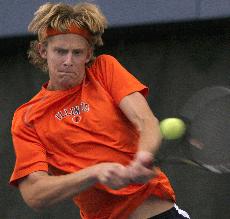Illini pair impress at All-American

October 9, 2006
Coming into the men’s fall tennis season, the Illini knew they had a dominant doubles team in Kevin Anderson and Ryan Rowe. But when star Ryler DeHeart left for the professional tour, they did not know if they would have an elite singles player in their ranks.
It turns out they have two.
Anderson and Rowe both advanced to the quarterfinals of the Polo Ralph Lauren All-American Tennis Championships, giving the Illini two players in the final eight of the first national tournament of the season.
Only a second-round loss in the doubles draw marred an otherwise successful week by the pair. Both players had their best finish in a national singles tournament before losing to the eventual finalists on Saturday. Anderson lost 5-7, 3-6 to defending champion John Isner of Georgia, and Rowe fell 0-6, 5-7 to the eventual champion, Arnau Brugues of Tulsa.
“When you get in that stage of a tournament, you start thinking you can maybe win it,” head coach Brad Dancer said. “But if you’re going to lose to someone, you want to lose to the guy in the finals.”
Get The Daily Illini in your inbox!
Rowe had to overcome cramping, a potentially disastrous second set and a pair of highly-ranked foes just to reach the quarterfinals. Ranked No. 48 coming in, he beat third-seeded Travis Helgeson in the second round and then faced a grueling three-setter from Brian Koniecko of Ohio State, a Big Ten star last year. After winning the first set, Rowe got up an early break in the second before losing his serve twice and dropping the set to the scrappy, frustrating Koniecko.
“A big thing with Ryan is that he stays levelheaded out there,” assistant coach Kent Kinnear said. “There were times when all the ingredients were there for him to get really frustrated, and he didn’t.”
As the third set began, Rowe’s left hamstring began to tighten up. By the time it ended, the sore hamstring was joined by his right quad and back, leaving Rowe drained on the court.
“It took a lot out of me,” Rowe said. “You don’t want to play quickly, you have to give yourself that rest and make sure you don’t play any more points than you have to.”
After a long game, Rowe broke Koniecko early in the third set and managed to hang on to his serve long enough to finish the match. But he was still feeling stiff when he got off to a slow start the next day against Brugues, failing to win a game in the opening set. He rebounded in the second and twice went up a break of serve over Brugues, but Rowe had trouble getting his first serve in and Brugues, with his home crowd behind him, took advantage to break serve three times to win the set.
“I think I did better than other players expected me to do,” Rowe said. “But I also think I could have done even better if I was in a little better shape.”
For Anderson, who rolled through the early rounds, fatigue was never an issue. But he simply ran into Isner, a great player, on his best day. The quarterfinal match featured perhaps the two best servers in collegiate tennis, but on this day, it was the rest of Isner’s game that made the difference. Both players held tight to their serves, but the Georgia player made fewer than five unforced errors over the entire match and took advantage of two slips from Anderson to win.
“Isner is 6-foot-10 and hitting serves that literally bounced over side fences and back fences,” Kinnear said. “Kevin got broken once in the first set and broken once in the second. When a guy is serving that well, you just can’t have any of those games.”
Anderson’s loss came at the end of a week in which he used his dominating serve to make several wins look easy over stiff competition. He began one match by serving four consecutive aces and did not lose his serve once in the first three rounds.
“We made some adjustments on Kevin’s serve the last few months and they really turned out well,” Kinnear said. “He just needs to get a little more consistent day-in and day-out.”
The Illini’s doubles loss was partly a result of unfortunate circumstance. Barely an hour after beating Koniecko, Rowe had to join Anderson against Diego Camacho and Ross Cunningham of Tulsa. The top-ranked Illini pair stayed close, but Rowe lost his serve one time, and that proved to be the difference in the match. The doubles matches were played in eight-game pro sets instead of normal three-set matches, which did not give the players a chance to rebound to form.
“I definitely felt very fatigued,” Rowe said. “There were a couple of shots here and there where I missed because I was feeling it from the last match. But not to take anything away from Tulsa, they just played a little better than us that day.”
In all, though, the Illini shined at the All-American. Before the tournament began, Rowe predicted that Anderson would surprise people with a deep singles run. As it turned out, both players showed they were capable of playing with the best competition.
“We were excited on the trip home talking about ways to get better,” Kinnear said. “They both feel like they can beat anybody on any given day.”






